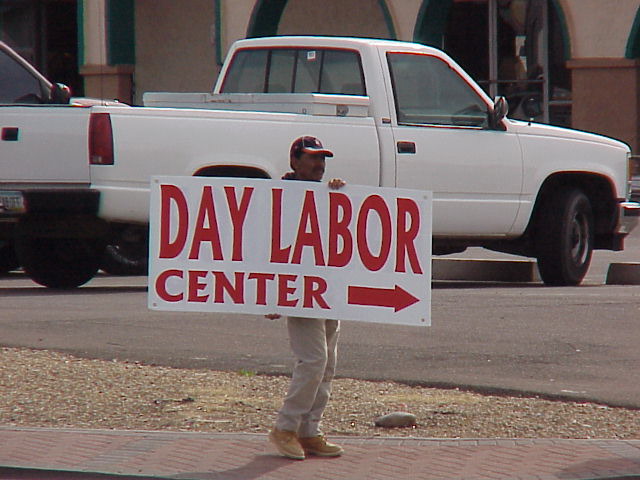

By: Carrie Stoner
Before the sun even rises in Phoenix, out of the closing shadows of night, dark and quiet silhouettes begin to appear. They are the silhouettes of working men who rise before the sun rises, each with the hope of obtaining work and earning money to help support their families. These men are usually assumed to be immigrants without the proper paperwork to work in the United States. They are also better known as day laborers.
These so-called “day laborers” congregate on street corners or in the parking lots of builders’ stores awaiting the arrival of employers who will hire them for a day’s work. Some cities have tried to ban this type of “recruiting” while others have accepted it as inevitable.
In Phoenix alone there are an estimated 2,500 day laborers ready, willing and able to work each and every day that stand on street corners hoping and praying they will be picked up by someone to work. Some days their prayers are answered and on others they are not.
Before September 11, 2001, you saw them everywhere – in hard hats on construction sites, working as landscapers, painters and just about anything else one can imagine. Today, these migrant workers are struggling under a sputtering economy and the harsh glare of the escalating U.S. homeland security system. To add even more problems to their already full plate, the immigration service in Phoenix is warning contractors against hiring undocumented day laborers. The warnings are taking a toll on many laborers in north Phoenix who had been getting constant work.
“I’ve worked only two days since last week” said Ruben Fuentes, a native of Tijuana. At the break of dawn on a Tuesday morning, the 20-year-old Fuentes joined dozens of others at the corner of Greenway Road and 29th Street to wait for someone to pick them up. “It’s getting harder,” he added and from my viewpoint, it looked like more men were left standing than were picked up for work on the day I chose to visit.
Unfortunately for everyone, contractors could face fines of up to $1,000 for each occurrence if they fail to fill out the proper immigration forms by the end of the workday said Victor Brower, deputy assistant district director for the Immigration and Naturalization Service in Phoenix. “It’s illegal to hire undocumented immigrants,” Brower said, emphasizing that if contractors knowingly employ undocumented workers, fines could then go up to $2,500
Unlike most undocumented individuals who try to avoid attracting attention, day laborers must make themselves conspicuous to find work. Obviously, this puts them at a higher risk of deportation. However, what I was surprised to find out is that some of these workers were not immigrants fresh from Mexico (as most people choose to believe) but rather, people who were raised right here in Phoenix, Arizona. People who went to elementary and high schools here and had no idea they were not United States citizens until they became of “working” age. How very hard that must be for someone to realize that even though this is the only home they have ever known, they cannot work here.
“What’s happened here is that these kids’ parents moved here when they were babies so they had no idea they were not United States Citizens until they tried to get a job” states Donna Davis, Vice President of Youth Development for the City of Phoenix. Davis also goes on to state that “we have tried every available resource known to us to help these kids get some type of employment. We have tried several Hispanic organizations within the city but unfortunately, their hands are also tied. The best advice we have gotten was to have them either apply at some Mexican food restaurants in town or go join the day labor pool at the various sites throughout the city.”
This revelation obviously takes away the “us and them” image of the day laborer. These are not all illegal immigrants who do not speak or write English but rather, educated, hard-working men who have no other alternative but to be an “on-duty” type of worker or go to some foreign country to work legally as this is the country they consider home!
Yesterday, these men built walls, mixed cement, cut grass and loaded furniture; they watered the strong American infrastructure with their sweat. Perhaps tomorrow, there will be more work, perhaps not. Today, May 13, 2003, they are “on duty”, waiting for those who seek their service for at least a day of work, or even just a couple of hours. They are day laborers, human beings who are criticized, but are still in demand. When we see them, we put on our mask of not even noticing them – that is, until the need for hiring their cheap labor knocks the mask off our face.
They say they are going to clear the streets off of day laborers – that their presence is threatening. One might ask threatening to whom? For life of me, I cannot figure out this one out!
These workers are taking jobs that as far as anyone can tell, nobody wants! These workers – the very same individuals who we may have possibly went to high school with – are not taking away jobs from “documented” workers but rather, pouring their heart, souls and sweat into a job that may last only a day or even an hour but that job is helping provide the barest of subsistence for their families. So, out of the shadows of the very early morning these silhouettes appear – silhouettes of men desperate to work jobs no one else wants. Tell me, what is so wrong about that?
Return to Carrie Stoner's Home Page
Return to Migration Home Page